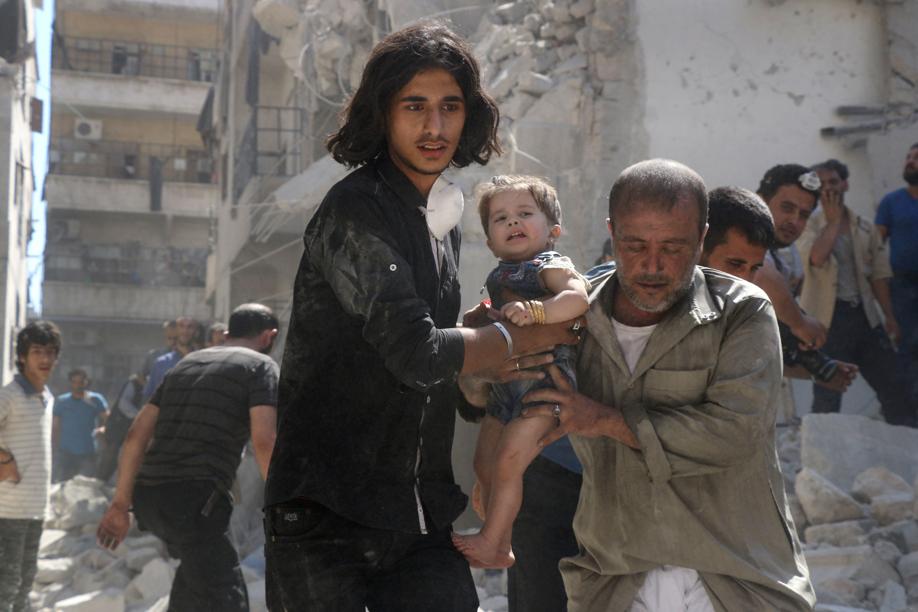
BEIRUT — The Syrian government embarked on a wave of intense airstrikes against opposition-controlled areas on Saturday, killing scores of people only hours after the announcement of a new cease-fire deal between Russia and the United States.
The attacks, which killed more than 80 people in the rebel-held cities of Idlib and Aleppo, compounded skepticism expressed by the opposition that this deal will work where others have failed to end the war.
The agreement was announced early Saturday in Geneva by Secretary of State John F. Kerry and Russian Foreign Minister Sergey Lavrov after months of haggling over details. It was hailed by the two leaders as a breakthrough in the quest to bring about a negotiated settlement to the five-year-old war.
The deal goes further than a more limited one that collapsed earlier this year because it places US-Russian military cooperation in the fight against terrorism at the center of the effort to end Syria’s war.
If implemented in accordance with the vision outlined by Kerry at an overnight news conference with Lavrov in Geneva, the agreement will transform the battlefield and bring about much-needed relief from the relentless suffering.
Civilians will be protected from airstrikes, desperate communities will receive all the food and medicine they need, Russia and the United States will work together to vanquish terrorists, and new negotiations will begin to secure an eventual end to the rule of President Bashar Assad of Syria and his regime.
The deal does not, however, address the inherent contradictions that have scuttled past efforts to end the fighting — including the question of why Assad’s government would cooperate with a process that the United States insists is intended to lead to his departure, or whether Russia supports that goal.
It also does not explain why the group identified as the chief target of the proposed US and Russian military cooperation would comply with a cease-fire intended to bring about its destruction. Kerry and Lavrov named as the main target of the proposed joint strikes the former Al Qaeda affiliate Jabhat al-Nusra — which has now rebranded itself as the Front for the Conquest of Syria, or Jabhat Fatah al-Sham.
The Syrian opposition said it would have to closely study the details of the deal before reaching a decision on whether to abide by it. The Syrian government had no immediate comment, though both Kerry and Lavrov said Russia had consulted Damascus and that Assad had given his assent.
Battles erupted across Syria as both sides took advantage of what may be the last opportunity to kill opponents and grab territory ahead of the implementation of the cease-fire, due to begin Monday.
Government warplanes struck a busy market in the northern city of Idlib, killing at least 36 people, according to activists and the human rights monitor the Syrian Observatory for Human Rights. They also carried out strikes over multiple neighborhoods in the city of Aleppo, killing at least 45.
Assad’s forces also seized more territory outside Aleppo, tightening the siege of opposition areas, according to the Syrian news agency SANA.
Residents of rebel-controlled eastern Aleppo expressed dismay that the cease-fire deal was reached only after government loyalists had succeeded in imposing a total siege of opposition areas by seizing control of the last rebel-controlled route on Sunday.
The agreement freezes the current front lines and therefore the siege in place.
In the south of the country, Syrian rebels announced a new offensive against government forces in the southern province of Quneitra.
Opposition spokeswoman Bassma Kodmani said there are many outstanding questions raised by the agreement.
Foremost is the question of whether there are meaningful enforcement mechanisms to deter the government from continuing to bombard civilians and regain territory from rebel groups.
According to the details spelled out in Geneva, after seven consecutive days of calm and the delivery of humanitarian aid, the United States and Russia will start working on a plan to carry out coordinated air attacks against terrorist groups.
Moderate rebels will be expected to disentangle themselves from the former Nusra group or face airstrikes themselves.


 PREVIOUS ARTICLE
PREVIOUS ARTICLE